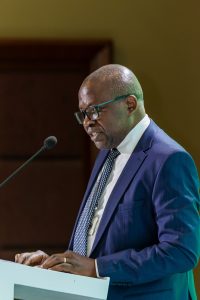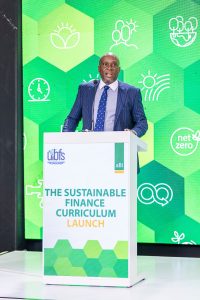A groundbreaking Sustainable Finance Curriculum has been launched to embed Environmental, Social, and Governance (ESG) principles into everyday banking and finance, marking a major step toward a greener financial sector.
The curriculum — developed by aBi Finance, the Uganda Institute of Banking and Financial Services (UIBFS), the Bank of Uganda (BoU), the Ministry of Finance, Planning and Economic Development (MoFPED), and the Uganda Bankers Association (UBA) with support from the European Union and Denmark — was officially launched at the Sheraton Kampala Hotel on Tuesday.
Speaking on behalf of the Bank of Uganda (BoU) Governor, David Kalyango, the Bank’s Head of Supervision, said the curriculum represents a “strategic shift toward sustainability at the heart of Uganda’s financial architecture.”

“At the Bank of Uganda, we view sustainable finance as a paradigm shift in the way financial institutions assess, manage, and report risk and opportunity,” Kalyango said. “It is no longer enough to be aware of ESG issues — we must institutionalise them within the DNA of our financial system.”
He explained that the Bank, working with the Uganda Bankers Association and partners, has already developed an ESG Framework anchored on governance, sustainable finance, risk management, and disclosures — all designed to guide financial institutions toward global best practices.
Kalyango added that starting in 2025, Uganda will implement IFRS S1 and S2 global standards, requiring banks to disclose sustainability and climate-related risks. “These regulatory requirements are becoming part of the new normal,” he said.

He noted that the country has already launched three supporting frameworks — the National Green Taxonomy, the National Climate Finance Strategy, and the Green Bond Framework — to guide responsible capital allocation and attract global green investment.
“The future of finance is one where profit and purpose are inseparable,” Kalyango emphasised. “Together, we can — and must — build a financial sector that is robust, principled, and sustainably profitable.”
Goretti Masadde, Chief Executive Officer of UIBFS, described the milestone as a defining moment for Uganda’s financial services sector.

“This curriculum could not be more timely for us at UIBFS. It embodies our mandate to professionalise Uganda’s financial services industry and our mission to be a centre of excellence in training and consultancy,” she said. “We are deeply honoured by the trust from aBi Finance and thrilled to see this transformative project come to life.”
The new curriculum aims to equip financial professionals, banks, and microfinance institutions with practical tools and frameworks to integrate sustainability into their operations, lending, and reporting practices. It is aligned with Uganda’s Vision 2040, the UN Sustainable Development Goals (SDGs), and the Paris Climate Agreement.
aBi Finance CEO Mona Muguma said the curriculum was born from a growing need in the sector for greater capacity and standardisation in sustainable finance. “Through the Sustainable Finance Curriculum, we’re building the capacity to channel finance toward women, youth, and refugee-led enterprises — driving sustainability from the ground up,” she noted.

She highlighted that over the past decade, aBi Finance has reached 2.2 million smallholder farmers—70 percent of them women—channelling more than USD 175 million in financing, creating 300,000 jobs, and generating USD 154 million in additional agribusiness revenue.
“The curriculum serves as a strategic framework for financial sector actors to align their decisions with global and national development priorities. It will strengthen our ability to mobilise capital for green, inclusive, and resilient enterprises,” she added.
Michael Mugabi, Board Chair of UIBFS and Managing Director of Housing Finance Bank, underscored that the future of Uganda’s financial system depends on sustainability.

“Sustainable finance is no longer optional — it is essential,” he said. “This curriculum empowers financial professionals to drive responsible investment, climate resilience, and Uganda’s transition to a green, inclusive economy.”
Felix Okoboi, Board Chair of aBi Finance, hailed the collaboration between partners as a model of purpose-driven transformation. “This milestone reflects the power of purposeful collaboration — a reminder that transformation happens when we work together toward a shared vision,” he said.

“Globally, finance has evolved from traditional banking focused on profit and risk to a dynamic system driven by innovation, data, and sustainability. The Sustainable Finance Curriculum is more than a learning tool; it’s a strategic enabler that helps institutions embed sustainability, driving resilience and long-term profitability.”
Representing the European Union Delegation to Uganda, Christine Banuta reaffirmed the EU’s commitment to supporting Uganda’s green economic transition. “As the EU, we’ve been pushing hard on the green agenda, ensuring that every development programme we support carries a green element,” she said.

“Together with MoFPED and GGGI, we launched Uganda’s National Green Taxonomy — a landmark framework defining and classifying green investments. We are now working with BoU and MoFPED to develop Uganda’s first-ever Green Bond Framework. The Sustainable Finance Curriculum complements these efforts by transforming the financial system from within.”
Danish Ambassador to Uganda, H.E. Adam Sparre Spliid, described the initiative as one of the most important environmental milestones of the year. “This launch is a critical step in aligning Uganda’s financial sector with global sustainability goals,” he said.

“Uganda is already facing the severe impacts of climate change — floods, landslides, and droughts that threaten livelihoods and the economy. Integrating sustainability into finance is not charity — it is smart business. It helps institutions protect their assets, clients, and the economy at large.”










